T.C. Marti's Blog, page 7
December 3, 2024
One short story that caught my attention and left me craving more last weekend

I’m one of those weird readers who often craves mid-length novels, or at least what I consider mid-length, as I find such descriptions rather subjective. For me, they’re books between 60 and 80,000 words, roughly the range that The Erik Blair Diaries found itself in, plus one I’m currently reading that I can’t get enough of, Shadow Runner.
But it doesn’t mean I won’t opt for the occasional short story if it catches my eye. Spark by Tracy Lawson is one of them. Another I’d read around that same time a few years back is slipping my mind, but I can assure you it had a hardcore libertarian viewpoint as it was about a family just exiting a society bought and paid for by, you guessed it, our enemy, the state.
The Libertarian Book Reviewer is a reader-supported publication. To receive new posts and support my work, consider becoming a free or paid subscriber.
I think the author’s name was Joe Vasicek or something along those lines. Anyway, it was a phenomenal short read and one I’ll share if I can locate it. But now I got another one to add: Blood & Faith by Scott Wasilewski. This one will come at you fast and hard, the way a short story should. And it packs a punch in character depth despite the short “screen time,” as I call it.
Two Deep Characters, One Eye-Opening RevelationYeah, that’s the only hint I’m giving here. Let’s just say that we got two characters, brothers, in fact, Jacob and Billy. And yes, I know, I remembered names for once, something I’m dreadful at 99.9 percent of the time.
Anyway, the brief, vague synopsis here is that Billy landed himself in trouble, Jacob is on his way to the rescue, and during the climax of this short stint, we get one moving revelation. One that I’ll sum up as, in a scenario like this, What would you do if you were facing the same predicament? Yeah, vague, but I’m not giving anything away here.
Either way, that would you rather scenario drove the story home for me. The whole do what is right or what is easy conundrum. Or, given the scope of this short read, both choices one of the two characters had to make would have been rough. Beyond rough. But, one may have left him better off in a manner of speaking, yet the what-if factor may have (excuse the echo) come into play.
As for the choice he made? Yeah, you can also say he’s better off in a way. But in another, he got hit pretty hard with some recoil. That’s all I’m saying here, and I hope I caught your attention.
Thanks for reading The Libertarian Book Reviewer! This post is public so feel free to share it.
Overall, this short story left me craving more. And if you’re interested in checking out the work, visit Scott’s site, and you’ll find it.
December 1, 2024
Why C.S. Lewis and J.R.R. Tolkien just graced my TBR list for 2025

On Wednesday, John Miltimore wrote on his Substack an article entitled Government Report: Reading ‘Lord of the Rings’ and ‘1984’ Could Make You an Extremist. Yeah, you heard that right.
While I have 1984 on the TBR list at the moment and recently finished its excellent spiritual successor, The Erik Blair Diaries: Battlefield of the Dead, I’ll admit that I’ve always been rather intimidated by J.R.R. Tolkien’s classic. That said, I never considered reading his legendary epic fantasy and yes, before you start joking around, I know, I know, TC has written his own epic fantasy, so why wouldn’t he read the genre?
The Libertarian Book Reviewer is a reader-supported publication. To receive new posts and support my work, consider becoming a free or paid subscriber.
Actually, I do read it. I just prefer shorter, sweeter reads like Chronicles of Narnia and this hidden gem called Shadow Runner by K.J. Fieler, which you’ll be hearing about soon. Anyway, why did I just add a good 10 more classics to the 2025 list? Seven from Narnia and three from Tolkien, among their other works?
Really, it’s just my way of flipping off an increasingly totalitarian state that my Quaker ancestors once called home. Okay, so maybe those Quaker ancestors won’t take too kindly to me flipping anyone off, but I can be a little rough around the edges.
Plus, those same Quaker ancestors, in turn, descended from who I’m 99.99 percent sure were Germanic and/or Norse Pagans (and odds are, so were some of yours, I’m guessing). So, sometimes the latter likes to rear its head. Yeah, and this is a guy who just admitted he’s got C.S. Lewis on the TBR list—hey I’m random, I’ll admit it.
What exactly is going on in the UK, anyway?Before I go further, let me just say I’m not ‘picking on’ or ‘singling out’ the UK. I know quite a few people from across the pond and every single one of them is awesome. Plus, there isn’t a single country on this planet that I’ll have a love affair with 100 percent of the time, at least until Ancapistan becomes a thing. Oh, and I’ll probably call every one of them ‘totalitarian states,’ at least in some capacity, at some point.
That said, an article from the Daily Caller entitled Reading Lord of the Rings And 1984 Could Lead To Right-Wing Extremism, Gov’t Report Warns. Since many left-leaning governments (plus those on the right, let’s not fool ourselves) like to use fancy definitions that collectively say something like, “Anything we don’t like is right-wing (or left-wing if the other side is in charge) extremism,” I saw a definite golden opportunity here to read, enjoy, and most likely hand out a trio of positive reviews of Tolkien’s classic in a quest to find what exactly this right-wing extremism is.
Anyway, to answer the question, the article linked above was actually first published nearly two years ago in February 2023. But it was kind of buried under cyber dust until good old Elon Musk brought it into the limelight.
Quoting Miltimore’s piece directly:
“One can see why UK bureaucrats see 1984 as a threat. Orwell’s magnum opus was a warning against precisely this kind of government overreach. The UK now sees the very best literature written by English authors in the 20th century as threats, gateways to “radicalisation.”
“The truth that the UK officials can’t seem to recognize is that they are the extremists.”
So, how did Miltimore come up with what he penned in the above quote? Well, he went on an internet odyssey to find out just what Prevent, a “programme that supports people who are at risk of becoming involved with terrorism through radicalisation,” was.
Miltimore quoted the following from the page:
“Prevent is a national programme that aims to stop people from becoming terrorists or supporting terrorism. It works to ensure that people who are susceptible to radicalisation are offered appropriate interventions, and communities are protected against radicalising influences. Radicalisation can happen when a person develops extreme views or beliefs that support terrorist groups or activities…
“Anyone who is being radicalised can be referred to Prevent. Referring someone ensures they get the help they need to keep them and others safe.” (emphasis mine)
I once watched a movie called Swing Kids, and if you’ve never heard of it, you need to do yourself a favor right now and check it out. Anyway, and if there was one common denominator in the hit classic, it’s that the protagonist, Peter Müller, and those in the Hitlerjugend were encouraged to spy on their friends, family, and even bosses, and to report them if they were caught or, in some cases, suspected, of working against or even insulting the Nazi Party.
What is so radical about J.R.R. Tolkien and C.S. Lewis?To be frank, I’ve never read Lewis’ nonfiction work and it may be a while before I get to it, as my fiction (and nonfiction) TBR lists are built for 2025. But, maybe the answer lies a little within Chronicles of Narnia and Lord of the Rings?
Obviously, both authors have written more than just these two well-known series, so the full answer may not come until 2026 or later, and that’s if I get one at all. My hypothesis? I'll likely find bits and pieces in each of their respective works and beyond, and get an answer that goes something along the lines of, “They’re preaching or implying things the UK Government doesn’t like.”
Thanks for reading The Libertarian Book Reviewer! This post is public so feel free to share it.
Mark me on that one, but it still doesn’t hurt to go on this little odyssey at some point in 2025.
November 27, 2024
The Erik Blair Diaries by John W. Whitehead: Final Thoughts and Official Review

John W. Whitehead is a big name in the libertarian movement, and my eyes are glued to every article he writes alongside Nisha Whitehead at the Ron Paul Institute. But he’s also experimented with writing fiction, something I’ve discussed in recent weeks when I crafted an open plea for him to write up a sequel to The Erik Blair Diaries.
I also praised his creativity, especially noting his ability to fuse several genres. It’s made the work stand out, and no, it doesn’t follow a strategic formula or anything like that. Both wins in my book, even if those stickler readers would disagree.
The Libertarian Book Reviewer is a reader-supported publication. To receive new posts and support my work, consider becoming a free or paid subscriber.
But hey, sooner rather than later, something more original needs to creep past the so-called “gatekeepers,” right? Of course! So, thank goodness for Whitehead, and once again, let’s hope The Erik Blair Diaries isn’t the last piece of fiction he writes.
What stood out in The Erik Blair Diaries?This one was easy: Whitehead wasted no time getting to the inciting incident and setting the story in motion. Some readers who crave more details might not like this since he likes to sprinkle them in, but for me, it was just enough to concoct a vivid picture.
It’s also a work that kind of reads like a video game, if that makes any sense. Erik and a rather kickass heroine named Eileen go on a more than a few death-defying missions throughout, something that was refreshing since you see a strong contingent of authors raise the stakes to that level only when the climax rolls around.
I’m a huge fan of Tracy Lawson’s Resistance Series and Kate L. Mary’s Beyond Trilogy, and they’re works that I’ll give a fresh read and review to in 2025, but the stakes didn’t grow to life-or-death proportions until those climactic scenes. This is what set Whitehead’s work apart, as he wasn’t afraid to up the ante time and again throughout the short, 192-page work.
Thanks for reading The Libertarian Book Reviewer! This post is public so feel free to share it.
I think I’ve previously described the pacing as ‘traveling faster than a speeding bullet.’ Not only is that an accurate statement; it seemed like the pacing picked up throughout. So, if you’re not a fan of slow beginnings or even drawn-out scenes, you’ll like The Erik Blair Diaries even more.
What could have been better?Honestly, the cliffhanger ending needs a sequel, and as mentioned, I wrote about that recently. There’s no way this book can’t contain at least two sequels, and it would be an outright travesty if Whitehead didn’t turn this into a series.
With sci-fi and fantasy elements that can use more depth, plus loose ends involving character arcs, the work is screaming for a sequel and there’s not a word or phrase in the English language that I can use to make that point clearer.
How is this book libertarian?Other than the fact John W. Whitehead wrote it? Well, it talks about totalitarianism, but one in which the masses don’t mind being subjected to so much government overreach that most of them don’t mind having a chip implanted into their brains.
Yeah, no, I think I’ll pass. Heck, you’re reading a guy’s blog who goes out of his way to have location settings turned off on all his devices, uses internet browsers like DuckDuckGo, and has half the mind to turn his phone off because he’s convinced it’s listening to him.
It also hits home on the ultimate decision of fighting to actually live life free from all the binds governments like to impose on us, both here in the present day and in this 2084 dystopia. It’s easy for the masses to just fall in line and obey orders, something that ran rampant during COVID even if Yours Truly turned his nose up at all of them and let the world see his whole face regardless of the situation.
One of the more frightening themes, though, is how it hits hard on what the government is hiding from us. In this book, and yeah, this might just be a thing in real life, talks about how some of the content on that big, moving screen we all like to watch might not be anywhere near as legitimate as we’d like to think. Take that as a hint as to why I don’t typically watch TV, even if I admittedly find hockey rather entertaining.
I don’t give star ratings, but…If I could give this book 10 stars, I would, but, unfortunately, I could only give it five. I also don’t often recommend books to my regular mailing list from this blog, instead opting to talk about books involved in newsletter swaps from authors in the same genre as my own.
But, since The Erik Blair Diaries is fused with dystopian, science fiction, and some fantasy, oh, the Readers Republic, that’s Readers without the apostrophe, will hear about this one with the full review attached.
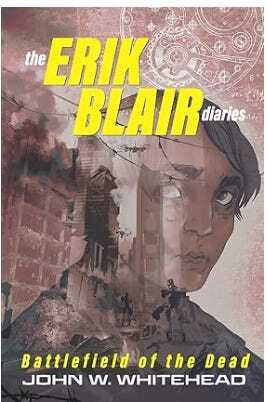
As mentioned, I’ll be reading this one again when I’m finished with my next batch of books on the TBR list, which now includes the Lord of the Rings and Chronicles of Narnia, but not before I discuss a couple of hidden gems I uncovered. I’ll explain why in another post.
November 24, 2024
Short Nonfiction Review: What Has Government Done to Our Money?

If you want to know why the money in your bank account is worth a fraction of what it was decades (or a century) ago, look no further than Murray N. Rothbard’s book What Has Government Done to Our Money. If you’re just breaking into Austrian Economics or if you’re like me and are rather layman in the subject, it’s a must-read.
One reason is that it’s not overly complicated. Not that I didn’t have some difficulty absorbing some of the work; that would be a lie. But again, I haven’t dedicated most of my adult life to economics since I’m too obsessed with writing and reading fiction.
The Libertarian Book Reviewer is a reader-supported publication. To receive new posts and support my work, consider becoming a free or paid subscriber.
That said, as my own fiction and much of the fiction I review on this site contains libertarian concepts, I want to explore some sources that those who wrote those fiction books may have, or have, explored.
Remember when I reviewed The Flight of the Barbarous Relic by George Ford Smith? Yeah, there’s a reason I’m following up that review with Rothbard’s classic, as it was one of the recommended reads. So, why wouldn’t I share it?
November 21, 2024
Lightning-fast read contained a strong mix of dystopian, sci-fi, and fantasy elements

Dystopian? Check. Science fiction? Check. Fantasy? Check. Hmmm, anyone who knows me will also know that I freaking love any book that fuses those three genres. Wonder why that is? Oh, right, it’s because dystopian, sci-fi, and fantasy elements like to run rampant in my own work, complete with libertarian messaging, might I add.
That said, I definitely found a cool comp title not only to share here but with my core reading audience. Because something tells me they’ll fall head over heels here.
When I first picked up The Erik Blair Diaries by John W. Whitehead, I thought I’d get simply a dystopian/sci-fi novel since the two run hand-in-hand. But no, I ended up with a work that contained just enough fantasy, making this one a complete genre-fusion read. And it’s something we don’t always have enough of across roughly 10 million-plus books on Amazon and other outlets.
The Libertarian Book Reviewer is a reader-supported publication. To receive new posts and support my work, consider becoming a free or paid subscriber.
The dystopian elements were self-explanatory, as this book is a ‘spiritual successor’ in many ways to George Orwell’s Nineteen Eighty-Four. But, with a mass surveillance state in 2084, in which there are numerous ‘robo animals’ and ‘insectoids,’ among other terrifying creatures, the fantasy concepts got me since one doesn’t even have to explain the latter if they don’t feel the need. In other words, they’re virtually limitless in every way imaginable.
Fantasy elements made The Erik Blair Diaries clickIn my previous piece (linked above), I mentioned that I can see a lot of what’s going on in this book happening in the future. But, of course, not all of it is possible, as Whitehead is still writing a story from his imagination. Or, at least I think that’s the case, as this guy is so knowledgeable he might know a thing or two that the rest of us don’t.
It’s, in many ways, the same style I used when I wrote The Rebellion Awakens, Book I in my Sentrys of Terrene Trilogy. And before you ask, I spelled Sentrys that way on purpose as opposed to Sentries.
Anyway, now that I got that little fun fact out of the way, the cautionary tale was the big picture behind Rebellion, sharing quite a few qualities with The Erik Blair Diaries. Here are just a few of those similarities (and warnings):
Mass surveillance
Mass tracking
Med tyranny
Recite and repeat what you’re taught without questioning
Dissenters will be rounded up and potentially termed
But still, elemental magic, rune magic, communication with spirits, and other good stuff added that extra element in Rebellion. For Whitehead’s work, I saw something similar and if The Erik Blair Diaries wasn’t complete initially, those extra elements treated me to some added entertainment.
November 19, 2024
An open plea to The Erik Blair Diaries author John W. Whitehead

It’s an eclectic bunch, but I can put The Erik Blair Diaries: Battlefield of the Dead up there with books like Spirit Legacy and classics like To Kill a Mockingbird. All three books are in different genres, but there is one common denominator that sticks with me: Each book is/was unputdownable, and those I can see myself reading almost annually if I’m in a TBR slump of subpar works.
It’s 2024, and we’re going on 2025 as I write this unofficial review, but in the age of woke-dominated creativity, it’s easy to get caught in a slump. I’m not saying I don’t have a diverse group of characters in my own books because that would be a lie, but you know what I mean: There’s a stark contrast between molding characters the way that one sees them as opposed to blatantly diversifying a cast just for the sake of wokeness, or whatever.
The Libertarian Book Reviewer is a reader-supported publication. To receive new posts and support my work, consider becoming a free or paid subscriber.
Thankfully, there are a few authors who have written fiction in the 2020s I can trust. Julane Fisher, who wrote The Text, is one of them. And it’s a book I’d recommend to any libertarian, even if its writing is clunky at times. But that’s not the case with Whitehead’s work, and while I’ve read virtually every article he’s submitted to the Ron Paul Institute featuring his and Nisha’s name, this guy was born to write fiction.
The Erik Blair Diaries: Spiritual successor to Nineteen Eighty-Four?Yeah, that was literally my nickname (or phrase?) for the book, except it’s not quite standalone, or at least that’s the vibe I picked up. Okay, it shouldn’t be standalone. As a huge fan of Kate L. Mary’s Beyond Trilogy (another highly recommended work for libertarians), The Erik Blair Diaries is a book that has got to become a dystopian sci-fi trilogy as it contains all the elements for it, especially with the way it ended.
Though different from Book I in Mary’s trilogy, Beyond the Wall, I got similar vibes. A lot of mystery of facing the unknown with maybe a ray or two of hope. I’m trying to be vague here so as to not spoil the plot, but trilogy elements aren’t the only reason Whitehead’s fictional book should spawn a couple of sequels.
If you’re someone like me who gets to dedicate a “solid” 30 minutes a day (even on weekends) to devour fiction, Whitehead’s work won’t bore you with details. It’s not just a fast-paced read; it’s ultra-fast, and there’s no slowing down once you pick this thing up and start embarking on this suspenseful roller coaster.
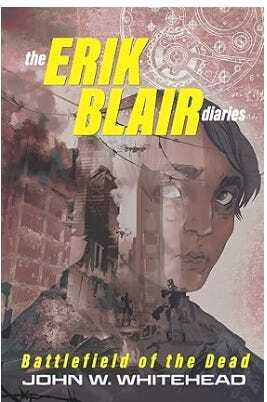
I wouldn’t say the work has the deepest characters, but they’re deep enough so you’re not looking at cardboard cutouts. This isn’t a bad thing, by the way. Erik, Eileen, and the numerous minor and supporting characters they cross all have interesting tales and you’re given the right amount of info, so that’s another one in the win column.
Realism of it allSome readers may scratch their heads at some of the ‘creatures’ we meet in The Erik Blair Diaries, but honestly, if you fast-forward 60 years into the future, is it really that far-fetched?
I’ve recently been reading Dr. Robert and Jill Malone’s PsyWar: Enforcing the New World Order slowly but surely so I don’t miss important details. It should be noted it takes me forever to read nonfiction since I’m rather anal about absorbing every last detail. Anyway, judging from what the Malones uncovered, I wouldn’t be surprised if we saw stuff that came straight from not just a dystopian novel but a horror film.
Back when I read Harry Potter and the Order of the Phoenix for the first time, I remember one of the characters (was it Remus Lupin?) who said something like, “There will be magic you never knew existed.” Well, let’s transform that comment into something those of us in the real world can relate to: There’s technology out there right now that we don’t even know exists, let alone in 2084.
Thanks for reading The Libertarian Book Reviewer! This post is public so feel free to share it.
What I’m getting at is, this isn’t some dystopian science fiction novel some random author just cooked up. Whitehead writes a lot, and I mean a lot, of nonfiction; just check out the link I shared to his and Nisha’s author page at the Ron Paul Institute. That said, there’s more realism to this work than one may think since this guy researches actual inconvenient truths for a living.
The open pleaWe’ve already seen a hint of what tyranny looks like in the 2020s if you remember the madness surrounding the COVID-19 pandemic. While it opened many of our eyes, there is still a strong contingent of people out there who will either support future mandates and restrictions, citing something like civic duty, or simply resigning themselves out of fear, saying something like, “Well, we gotta follow it because it’s the law.” I actually had a few people try to tell me that.
Anyway, not only would expanding this work create an exciting and fast-paced trilogy featuring a cast of characters with the right amount of depth, but it also provides readers with an entertaining read. Sure, the work is fictional, but someone with Whitehead’s credentials means that these readers in the masses might start peeking around the corners of their blinders and look more into his nonfiction work.
Then, the snowball effect could potentially begin. I’m talking about conducting research into, and reading works from The Mises Institute, FEE, AIER, FFF, and other alternative outlets that know more than just a thing or two about the truth. And it all stems from entertaining fiction and its influences.
More fiction, good, solid, ultra-fast-paced fiction from libertarian-minded authors, would at least plant a few seeds and potentially expose more readers to alternative media when they may not otherwise seek it out themselves. It’s just a thought, but one I would implore John W. Whitehead to take a long, hard look into exploring.
The Libertarian Book Reviewer is a reader-supported publication. To receive new posts and support my work, consider becoming a free or paid subscriber.
John, I hope you read this unofficial review and take note of this plea because you have a lot of talent for writing entertaining fiction and you also have expertise in the realm of mass surveillance and God knows what else to back it up.
November 17, 2024
New lead magnet kicks off a Harry Potter in Reverse book series
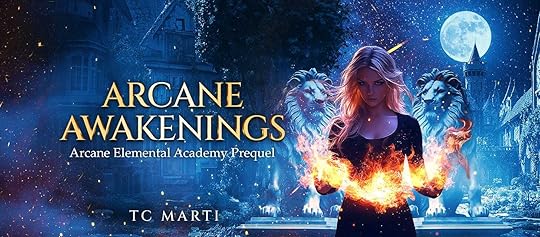
Often, I only post content on Monday, Wednesday, and Friday, which is usually a book review (or partial review), a scene (or scenes) that jumped out at me, and a listicle. But, every time I unleash a new lead magnet, better known as a free book, I also like letting all subscribers on my multiple mailing lists know about them.
This one kicks off a series called Arcane Elemental Academy, entitled Arcane Awakenings, and it’s a series that I’ve often dubbed Harry Potter in Reverse. It stemmed from a Quora question from the Spring of 2024 that went something like, “What if Lord Voldemort just adopted Harry?”
The Libertarian Book Reviewer is a reader-supported publication. To receive new posts and support my work, consider becoming a free or paid subscriber.
I was unable to locate the original link, but that’s beside the point. The creative juices flowed, and I immediately embarked on writing a young adult fantasy novel called The Arcane Prophecy, which I’ve already taken through a couple of story edits; its third round coming up on December 1st.
Arcane Awakenings awakens a new series and then some…This lead magnet, however, Arcane Awakenings, takes place toward the end of Yote Diamondback’s middle school career. Its themes are naturally libertarian, as Yote begins to see the misfortunes of intense oversight in government schools, or in her case, even the private school system (she’s super-rich, lol), in their quest to spew indoctrination as opposed to education.
The novelette Spark by Tracy Lawson heavily influenced Arcane Awakenings’ plot, albeit the two works reside in different genres. It also opens up to Yote’s struggles to keep pace with her sister, Jett, and Jett’s two best friends, Lindsey and Paisley.
Anyway, Arcane Awakenings also kicks off my own niche in libertarianism, and there are quite a few niches. For me, it boiled down to foreign policy, legacy media narratives, money and banking, or education. And while some of my other works touch on all of the above, education emerged as the victor.
That said, should you decide to download the work AND join its corresponding mailing list, The Enlightenment (this is optional, by the way), much of it will focus on two issues:
Progress in the Arcane Elemental Academy series, specifically The Arcane Prophecy
What has government done to our education?
It’s a project that has been waiting in the wings for six months, and that particular list will catch an email once every three weeks, starting in January 2025, since I also post to different groups involved in my science/dystopian fantasy and dark epic fantasy genres.
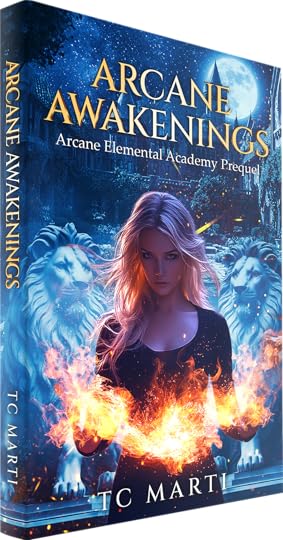
I’ll also be reviewing some nonfiction works regarding education in America right here on weekend days, as this is a book review blog. Books like Education Without the State by Tom Woods and Education Free and Compulsory by Murray N. Rothbard are on deck.
November 15, 2024
Two literary classics and one childhood favorite that will celebrate special anniversaries in 2025
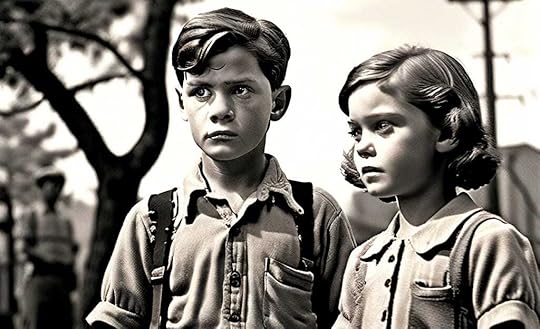
While I work my way through a libertarian dystopian fiction onslaught with some good old Harry Potter sprinkled between reads—hey, it’s that time of year—there are three all-time favorites gearing up for their 100th, 65th, and 25th anniversaries.
And yes, I’m starting to feel rather old, considering Book No. 3 on this list was released when I was in the fourth grade, and I think I read it like two years after it came out. You may have never heard of it, but if you have kids at the mid-grade level or the equivalent, it’s worth reading, trust me.
The Libertarian Book Reviewer is a reader-supported publication. To receive new posts and support my work, consider becoming a free or paid subscriber.
As for the other two, you’ve heard of them. In fact, I’m sure you could have guessed Book No. 1 on this list without even looking, right? If not, keep reading, and you’re going to be like, “Ohhhh….yep….”
Book No. 1: The Great Gatsby by F. Scott FitzgeraldWords can’t express how entertaining I find this book. But then again, doesn’t this one hit home on human nature? It wasn’t until much later did I realize that the work had a bit of a true story inspiration to it, making The Great Gatsby even more memorable.
See, F. Scott Fitzgerald had this obsession with socialite with Ginevra King, whom he’d had a relationship with at one time. The two fell in love but, unfortunately, King’s family wasn’t too thrilled about her courting Fitzgerald, thanks to their differences in social status. Bummer, right?
That would be like you meeting your celebrity crush, the two of you finding yourselves head over heels for one another, but nobody seems to approve of it, then bam, it’s game over. Anyway, Ginevra married some rich guy named Bill Mitchell, so Fitzgerald proposed to another girl with money named Zelda Sayre—just for the record, that’s gotta rank No. 1 for the coolest name ever.
But Zelda wanted to ensure Fitzgerald had some money before marrying him. And yep, you can guess what happened: Fitzgerald went on a mission to make some serious dough, just like our old sport, James Gatz. Yeah, you want to read that book now, don’t you, knowing it was a reflection of Fitz’s personal life?
Once April 10th arrives, I’ll be binge-reading this book.
Book No. 2: To Kill a Mockingbird by Harper LeeThis one qualifies as one of the best books I’ve ever read, hands down, and if you’ve read it, it probably left a lasting impression. In fact, it wasn’t until a few days ago did I cross some random person (going to be vague about where) and I nicknamed them Boo Radley, despite having last read To Kill a Mockingbird in 2017.
Hey, I give everyone I don’t know nicknames, especially at my local gym. Some of which are nicer than others. Anyway, back to the work at hand: I know it’s a polarizing one, but if I ever decide to pass on my DNA at some point, it would be one of many books I’d love to see the Little TCs read.
Well, that and about a thousand other works. But I’d probably start them off with something small like, Oh, the Places You’ll Go by Dr. Seuss, so they’ll learn to never trap themselves in the infamous ‘waiting place.’ Best scene in the book, y’know?
Again, back to the work at hand: To Kill a Mockingbird also features one of my favorite protagonists, Jean Louise “Scout” Finch. Fierce, independent, curious, and intelligent. In a way, Scout personifies that now-popular strong female protagonist, a trope that I can hardly get enough of these days.
Thanks for reading The Libertarian Book Reviewer! This post is public so feel free to share it.
Anyway, I can’t wait until July 11th, 2025, rolls around because you know what I’ll be doing then.
Book No. 3: A Year Down Yonder by Richard PeckI first became interested in Richard Peck in 2001 when I had to write a report about him back when I was in middle school—one of the few assignments that year I actually looked forward to. Not long after, I stumbled upon what was then a rather newly-published book called A Year Down Yonder.
And in case you're looking for the libertarian message in this one, well, there are several, the first of which occurs within the first few pages. Here’s your hint: The book was set in 1938, and our main character, Mary Alice Dowdel, is forced to live with her grandmother for an entire year after Franklin D. Roosevelt’s mass interventionist campaign didn’t quite work wonders for her parents.
Big surprise, right? Anyway, this one’s unique as it’s classified as a novel yet reads more like a short story cycle. Each chapter comprises a story within the story, much like its predecessor and another favorite, A Long Way from Chicago.
That said, it’s more of a cozier tale than the other two since its genre is technically children’s historical fiction and one that I’ll have on the nightstand when I’m looking for an uplift in my current mood following some hardcore dystopian reads.
The Libertarian Book Reviewer is a reader-supported publication. To receive new posts and support my work, consider becoming a free or paid subscriber.
Chances are, I probably won’t wait until October 2025 to read this one unless I can stretch out a few other books from my middle school days, including The Giver, A Long Way from Chicago, and Number the Stars—quite a few libertarian concepts in that last one for sure.
November 13, 2024
Preston Mathews proposal of monetary policy in The Flight of the Barbarous Relic

By now, you’ll know that The Flight of the Barbarous Relic by George Ford Smith is a book that I labeled a ‘must read’ for all libertarians and how it can serve as a blueprint for libertarian fiction. Libertarian fiction should, as in George Ford Smith’s book, contain two ingredients:
A fun plot that readers in your primary genre (fantasy, sci-fi, thriller, etc.) to catch and hold their interest, and…
A lesson from the libertarian point of view, specifically, the Austrian point of view.
The latter is something that George Ford Smith hit a home run with, but I know not all readers are interested in checking out a political thriller. Personally, I’m up for anything that has a fun plot that criticizes the overarching arm of the state, but since that doesn’t hold true for everyone, like those who prefer a certain genre, I wanted to summarize a part of the book’s most important chapter because it contains an essential trade-off in returning to the gold standard.
The Libertarian Book Reviewer is a reader-supported publication. To receive new posts and support my work, consider becoming a free or paid subscriber.
Now, I’m not quoting the entire 27-page chapter, or else this article could comprise thousands of words. Instead, I’m using quick bullet points in the section below, broken by short paragraphs featuring my own thoughts on how returning to the gold standard would shrink the federal government dramatically.
Preston Mathews’ three steps to reinstituting the gold standardSo, in the work, Preston Mathews lays out a simple blueprint that would take the US off the destructive path it’s currently on, thanks to the fiat dollar. This is outlined in three steps that would, should any administration have the courage to try it, look rather simple.
Repeal all legal tender laws to keep the government from constantly increasing the money supply.
Deactivate and ultimately abolish the Fed.
Reintroduce the gold standard and convert existing federal reserve notes and bank deposits into gold.
Easy objectives, right? In the short term, the legacy media and its allies would grill this proposal should it occur since Mathews admitted it would cause hardships in the short term. But, in the long-term, this would be the preferred system, mainly because it would restrain government from upholding its warfare-welfare state that it loves so much with the current fiat dollar.
Thanks for reading The Libertarian Book Reviewer!
It would ultimately shrink the size of the federal government, leading to the downfall of many of the alphabet agencies that run our lives whether we know it or not, and, ultimately, fare much better in the way of keeping prices for goods and services in check.
November 11, 2024
The Flight of the Barbarous Relic should be the blueprint of libertarian fiction

I’ve spent years looking for a book like The Flight of the Barbarous Relic. Years searching for a book that I can point at and say, “That’s it. That’s the blueprint for libertarian fiction.” Sure, I’ve written books that criticize state and legacy media’s mis and disinfo campaigns, plus their relentless ridicule if you don’t abide by their narrative.
That was the basis of Wind Wielder, a dystopian science fantasy with military thriller undertones. But wow, I wish I could have that one back. George Ford Smith’s ability to write a fast-paced novel while just spoon-feeding a libertarian-leaning lesson or two in there before the climax was something I haven’t seen from many authors, regardless of their book’s political leanings.
And let’s face it: Just about every book out there has them. Some are more open-ended and you can spin them in any way you want. In others, you know where they’re going not long after you start reading them. Ford’s work fits into the latter category, making it a must-read for libertarians, even if the state apologist might want you to think otherwise.
The Libertarian Book Reviewer is a reader-supported publication. To receive new posts and support my work, consider becoming a free or paid subscriber.
Note, however, that I said ‘might,’ and that’s because it still provides an entertaining read to ultimately teach readers about the atrocities that the Fed brings.
What really drove The Flight of the Barbarous Relic home?How many of us have sat in a government school, almost bored to tears because somewhere between seventh and twelfth grade did we realize we were having the same old stories drilled down our throats?
Or, better yet: How many of us can now rephrase ‘same old stories’ for ‘same old propaganda?’ Yeah, government schools do their jobs on many of us early, and we leave high school spewing statist narratives whether we realize it or not. At least until we discover Ludwig von Mises, right?
I honestly wish I was paying attention during my junior and senior years of high school just so I could recall at age 33 what my history and honors citizenship teachers were saying about the Great Recession. For context, I graduated in 2009, so it was a thing during my latter days of high school.
Anyway, how does this relate to Ford’s underrated work? Basically, the latter stages of the book feature a long, long, long lecture about the complete history of money and banking, starting with barter and ending with just how much fun the Fed has had devaluing the dollar since 1913 and causing the very same thing it leads the masses to believe that it fights: Inflation.
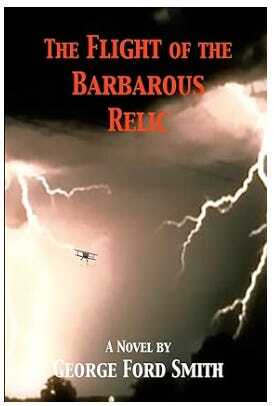
But instead of those boring lectures you got in your government school and have probably spent years spitting out what they wanted you to think, this one is interesting because it actually sheds light on the matter. It tells the truth about why the Fed really exists and busts a few state-driven myths. Oh, and if you want a hyphenated word hint on the true nature of the Fed, I’ll give you one: Welfare-Warfare.



